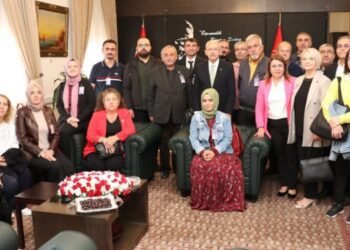Visually impaired Turkish journalist Cüneyt Arat, who was jailed in July 2017 over alleged links to the Gülen movement, sent a letter through his lawyer over the weekend stating that the $350 monthly benefit the government normally pays to disabled people had been cut. The discontinuation of his assistance was announced on Arat’s Twitter account.
Arat’s family lives in Adana, but the journalist has been sent to a prison in İzmir’s Menemen district, which makes it difficult for family members to visit him.He was initially jailed in Tarsus, a district of Mersin close to Adana.The ward in which Arat is jailed has no windows and is extremely damp, according to messages sent from his Twitter account, which is managed by his lawyer.Arat was sent to prison on July 10, 2017, after an appeals court upheld his sentence of eight years, 10 months and 15 days.
According to Arat’s tweets on July 10, he decided to turn himself in after learning that a Gaziantep regional appeals court had upheld a jail sentence handed down by a lower court.Arat was sentenced on Feb. 22, 2017, to six years, three months due to alleged links to the Gülen movement, which Turkish authorities accuse of masterminding a failed coup in the summer of 2016. He was also given one year, 10 months and 15 days for promoting a “terrorist” organization.
“Two policemen insulted me and swore at me on the TEM highway. They shouted at me, saying: ‘You are responsible for the deaths of 249 people. You are a murderer’,” Arat tweeted.He was arrested on July 21, 2016, for social media posts that allegedly praised the Gülen movement.
The disabled journalist was placed under house arrest wearing an electronic ankle bracelet until February 2017.
Arat, who has been accused of membership in the Gülen movement, labeled by the Turkish government as the organizer of the failed coup in July 2016, was given a suspended sentence in June 2017 by an Adana court for praising Turkish Islamic scholar Fethullah Gülen and the Gülen movement he inspired.
In his last tweets late on July 10, 2017, Arat said his Twitter account would be managed by a friend of his who is abroad if he was put in jail and said he might be tricked and forced to sign some declaration or documents he doesn’t agree with.
“Let my friends know that I never did anything I should regret,” he tweeted.In a series of tweets after his arrest, Arat’s friend shared photos of him while he was being taken to prison from the police station where he turned himself in.
Turkey is ranked 157th among 180 countries in the 2018 World Press Freedom Index released by Reporters Without Borders (RSF). If Turkey falls two more places, it will make it to the list of countries on the blacklist, which have the poorest record in press freedom.
Turkey is the biggest jailer of journalists in the world. The most recent figures documented by SCF show that 239 journalists and media workers were in jail as of October 31, 2018, most in pretrial detention. Of those in prison 170 were under arrest pending trial while only 69 journalists have been convicted and are serving their time. Detention warrants are outstanding for 148 journalists who are living in exile or remain at large in Turkey.
Detaining tens of thousands of people over alleged links to the Gülen movement, the government also closed down some 200 media outlets, including Kurdish news agencies and newspapers, after a coup attempt in Turkey on July 15, 2016. (SCF with turkishminute.com)





















